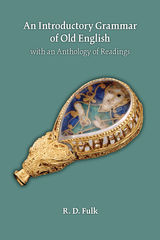
A new edition featuring Saint Augustine’s dialogue on immortality from a tenth-century Latin manuscript, accompanied by an Old English vernacular adaptation translated into modern English for the first time in a hundred years.
Around the turn of the tenth century, an anonymous scholar crafted an Old English version of Saint Augustine of Hippo’s Soliloquia, a dialogue exploring the nature of truth and the immortality of the soul. The Old English Soliloquies was, perhaps, inspired by King Alfred the Great’s mandate to translate important Latin works. It retains Augustine’s focus on the soul, but it also explores loyalty—to friends, to one’s temporal lord, and to the Lord God—and it presses toward a deeper understanding of the afterlife. Will we endure a state of impersonal and static forgetfulness, or will we retain our memories, our accrued wisdom, and our sense of individuated consciousness?
This volume presents the first English translation of the complete Old English Soliloquies to appear in more than a century. It is accompanied by a unique edition of Augustine’s Latin Soliloquia, based on a tenth-century English manuscript similar to the one used by the translator, that provides insight into the adaptation process. Both the Latin and Old English texts are newly edited.

This volume is a companion to The Old English and Anglo-Latin Riddle Tradition. Its extensive notes and commentary on hundreds of Latin, Old English, and Old Norse–Icelandic riddles illuminate and clarify the multifaceted and interconnected nature of a broad, international tradition. Within this commentary, readers will encounter a deep reservoir of knowledge about riddles produced in both Latin and Old English during the Anglo-Saxon period, and the literatures with which they were in dialogue.
Riddles range from those by prominent authors like Aldhelm, Bede, Alcuin, and Boniface to those presented anonymously in collections such as the Exeter Book. All are fully discussed, with particular attention paid to manuscript traditions, subject matter, solutions, style, sources, parallels, and recommendations for further reading. Consideration is given to running themes throughout the collection, comparisons to other riddles and to other literature more broadly, and important linguistic observations and manuscript readings. The commentary also lists the manuscripts and earlier editions for each riddle, extensive catalogues of proposed solutions, and additional bibliographic references. Following the general discussion of each riddle there is detailed line-by-line annotation.
This authoritative commentary is the most comprehensive examination to date of the bilingual riddle tradition of Anglo-Saxon England and its links to the wider world.


What offers over seven hundred witty enigmas in several languages? Answer: The Old English and Anglo-Latin Riddle Tradition. Riddles, wordplay, and inscrutable utterances have been at the heart of Western literature for many centuries. Often brief and always delightful, medieval riddles provide insights into the extraordinary and the everyday, connecting the learned and the ribald, the lay and the devout, and the familiar and the imported. Many solutions involve domestic life, including “butter churn” and “chickens.” Others like “the harrowing of hell” or “the Pleiades” appeal to an educated elite. Still others, like “the one-eyed seller of garlic,” are too absurd to solve: that is part of the game. Riddles are not simply lighthearted amusement. They invite philosophical questions about language and knowledge.
Most riddles in this volume are translated from Old English and Latin, but it also includes some from Old Norse–Icelandic. The Old English and Anglo-Latin Riddle Tradition assembles, for the first time ever, an astonishing array of riddles composed before 1200 CE that continue to entertain and puzzle.
READERS
Browse our collection.
PUBLISHERS
See BiblioVault's publisher services.
STUDENT SERVICES
Files for college accessibility offices.
UChicago Accessibility Resources
home | accessibility | search | about | contact us
BiblioVault ® 2001 - 2024
The University of Chicago Press









